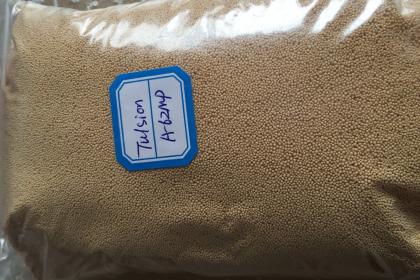工业废水中氮的来源有多种,例如印染废水中的尿素、电镀废水中的氨水、钢铁行业中的硝xiao酸等等,这些物质的高占比使得氮元素在综合废水中的比例也随之升高,这些行业的常规废水站通常设置生物池,利用微生物的生理代谢来处理废水中的氮元素,但是不同于生活污水,工业废水并不适合微生物生长繁殖,不仅抑制菌类繁殖且会使微生物大量致死,使脱氮效果微乎其微。过去,人们不曾意识到氮元素有哪些危害,很多企业在处理废水过程中并没有真正正视脱氮的环节,导致水体恶化,藻类大量繁殖,鱼yu虾不断死亡,水域环境恶化升级,在后续的研究中,人们发现,硝xiao酸盐在人体中会转化为亚硝xiao酸盐,不仅会影响氧的传输能力,还会与蛋白生成亚硝胺这类强致ai物质,于是,人们开始重视废水中氮的去除。
There are many types of the source of nitrogen in the industrial wastewater, such as ammonia urea in printing and dyeing wastewater, electroplating wastewater, xiao nitrate acid in the steel industry, etc., these substances high proportion makes nitrogen also will increase in the proportion of comprehensive wastewater, the industry of conventional wastewater treatment station usually set biological pool, use of microbial physiological metabolism to deal with waste water in nitrogen, but different from the domestic sewage, industrial waste water is not suitable for microbial growth, not only restrain bacteria breeding and will kill a massive, causes the denitrification effect. In the past, people never aware of the dangers of what are nitrogen, many enterprises in the process of wastewater treatment and no real denitrification in the face of link, leads to the deterioration of the water, algae blooms, yu, shrimp fish died, water environment deterioration upgrade, in subsequent studies, it has been found that xiao acid salt nitrate in the human body will be converted to the xiao nitrate acid salt, not only affect the oxygen transfer ability, will also with protein generate nitrosamines such strong material to ai, so people began to pay attention to the removal of nitrogen in the wastewater.
在化学脱氮法、电渗析法、离子交换法、催化氧化法、反渗透法、生物脱氨法中,去除硝酸盐广泛使用的是生物脱氮法,生物脱氮法是将废水进行物化预处理后通过微生物在好氧、厌氧条件下的不同生化反应,将硝态氮还原为氮气的过程。
In the chemical denitrification method, electrodialysis method, ion exchange method, catalytic oxidation method, reverse osmosis, a biological ammonia method, is the most widely used to remove nitrate biological nitrogen removal method, biological denitrification method will be materialized after pretreatment wastewater by microorganism in aerobic and anaerobic conditions of different biochemical reactions, the nitrate reduction process for nitrogen.
生物脱氮法以其成熟的工艺、低廉的运行成本、较好的处理效果等优势在国内外的废水脱氮处理中占据主流位置,但生物脱氮法也存在一定的缺陷,如:生物挂膜难、富集慢; 对工业废水耐受力差; 反应器的局限性使脱氮负荷低; 生化占地面积较大; 多个反应池组合造成结构复杂; 脱氮效率低,需较长停留时间等。
Biological denitrification has occupied a mainstream position in wastewater denitrification treatment at home and abroad by virtue of its mature technology, low operating cost and better treatment effect. Poor tolerance to industrial wastewater; The limitation of the reactor makes the denitrification load low. Biochemistry covers a large area. The combination of multiple reaction pools resulted in complex structure. The denitrification efficiency is low and the residence time is long.
针对生活用水、生活污水、工业废水等硝态氮的去除可以采用科海思代理的美国Tulsimer进口离子交换树脂。
Tulsimer®A-62 MP 由于其本身的大孔特性而显示出了优越的物理特性和化学稳定性,适合于在广泛的 PH 范围内和温度条件下使用,它在饮用水处理方面可达到食品级的标准。
Tulsimer® A-62 MP 具有很强的抵抗有机物污染的能力,因此它可适用于含高浓度有机物和颜色的水质,在工业用水和家庭饮用水方面具有极强的硝酸盐去除能力。
典型特性(TYPICAL CHARACTERISTICS) :Tulsimer® A-62 MP
型式/Type 大孔强碱性阴离子交换树脂
主体结构: 聚苯乙烯共聚物
物理型式: 含水球状
官能基: I 型季胺官能基
离子型式: 氯/Chloride
总交换树脂: 1.0meq/ml
目数:) 16 to 50
粒度: 0.3-1.2mm
湿度: 52±3%
PH 范围: 0-14
温度: 90℃(195℉)
溶解性: 不溶于任何容积
反冲洗浓度比: 700-750g/l(43-47lbs/cft)
膨胀系数: Cl- 到 OH-20%
主要优势 :Tulsimer® A-62 MP
1、 选择性吸附:对于NO3-有优先选择吸附性,受其他阴离子影响很小
2、

